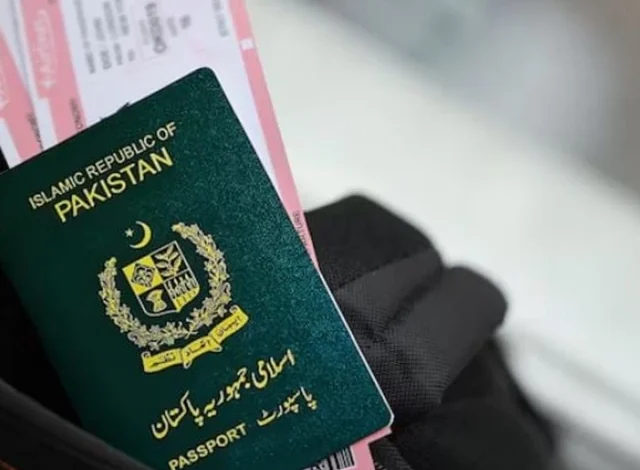The Pakistani passport continues to decline in the world rankings.

According to the most recent Henley Passport Index, Pakistan’s passport has dropped a number of spots and is currently tied with Yemen for 103rd place worldwide. Compared to its prior ranking of 96th, when 32 nations allowed Pakistani passport holders to enter without a visa, it now only has visa-free access to 31 countries, a significant drop.
Pakistan’s standing has declined in the face of increased regional competition, according to the Henley Passport Index, which rates passports according to the number of places their holders can visit without a previous visa.
In the current worldwide rankings, Iraq is ranked 104th with 29 destinations, Syria is ranked 105th with 26 destinations, and Afghanistan is ranked 106th with 24 destinations. All of these countries are below Pakistan.
Pakistan now has one of the weakest passports in the world, with fewer nations granting visa-free travel. The indicator shows a widening gap between the South Asian country and countries with more global connectivity.
The Indian passport drops to the 85th spot.
In the most recent Henley Passport Index rankings, the Indian passport has also dropped a number of spots, landing in 85th place, tied with Mauritania. Earlier this year, the passport was ranked 77th, with visa-free entry to 59 countries; now, it is only allowed to enter 57 countries.
India is currently lagging behind a number of nations in terms of travel freedom, which is indicative of a change in the dynamics of global mobility. Despite India’s increasing worldwide impact, the country’s continued difficulties in gaining more international access are highlighted by the passport’s decline in the rankings.
Singapore is ranked first in the world.
According to the most recent Henley Passport Index rankings, Singapore’s passport continues to be the strongest in the world, granting visa-free entry into 193 countries. With visa-free entry to 190 and 189 countries, respectively, South Korea and Japan are just behind.
With access to 188 locations, Germany, Italy, Luxembourg, Spain, and Switzerland are in fourth place. These European nations’ continued competitiveness is a reflection of their solid international and diplomatic ties.
The top five countries—Austria, Belgium, Denmark, Finland, France, Ireland, and the Netherlands—all have visa-free travel to 187 locations. With Singapore’s passport taking first place for the fourth year in a row, the rankings highlight Asia’s increasing dominance in global mobility.
US and UK hit a record low
The United States has dropped out of the top 10 most powerful passports in the world for the first time since the Henley Passport Index was established twenty years ago. Only 180 out of 227 nations allow visa-free travel, and the US passport, which was once ranked #1 in 2014, is currently tied with Malaysia for 12th place.
Similarly, since July, the UK passport has fallen from sixth to eighth place, its lowest ranking ever. Similar to the United States, the United Kingdom was the index’s top-ranked country in 2015.
“The decline of the US passport and its most recent drop from 10th to 12th position has been driven by a series of access changes,” stated Henley & Partners. “The loss of visa-free access to Brazil in April, due to a lack of reciprocity, and the US being excluded from China’s expanding visa-free list, were the key factors behind its downward slide.”
According to the article, “Adjustments from Papua New Guinea and Myanmar, as well as Somalia’s new eVisa system and Vietnam’s exclusion of the US from its latest visa-free list, contributed to the final blow, pushing the US out of the top 10.”
China’s passport ranking climbs globally
China rose from 94th rank in 2015 to 64th place in 2025, making it one of the iIndex’s largest climbers over the last ten years. With 37 more destinations added over this time, the country’s visa-free travel has significantly improved, as evidenced by this spike.
According to a research by Henley & Partners, “Recent developments, including granting visa-free access to Russia, underscore Beijing’s ongoing strategy of increased openness.” “China’s moves — alongside new agreements with the Gulf states, South America, and several European countries — are cementing its role as a global mobility powerhouse, bolstering the Asia-Pacific region’s dominance in travel freedom.”
This increase highlights China’s expanding diplomatic clout and its calculated attempts to expand the freedom of travel for its people. The nation’s standing in international transportation, especially in the Asia-Pacific area, is being reinforced by its growing interconnectedness.